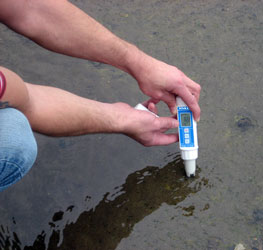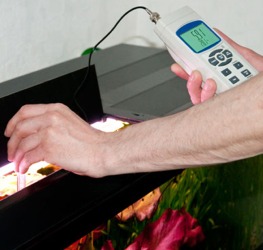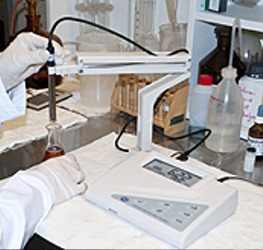|
pH Testers
At PCE Instruments you will find pH testers for use in laboratories, aquariums, or in the industrial sector to measure pH value.  Our pH testers from Hanna Instruments provide a complete range of devices. These handheld pH testers bring together almost all the characteristics available in the "best" handheld devices. These pH testers represent the best solution for quick and portable results for measuring pH values. One of these pH testers , the Combo, also measures conductibility and temperature. Our pH testers can be calibrated, come with pH electrodes and with ISO certification. If you can't find the pH testers you are looking for, please contact us and we will help you find the best solution to suit your needs by calling our offices on: Our pH testers from Hanna Instruments provide a complete range of devices. These handheld pH testers bring together almost all the characteristics available in the "best" handheld devices. These pH testers represent the best solution for quick and portable results for measuring pH values. One of these pH testers , the Combo, also measures conductibility and temperature. Our pH testers can be calibrated, come with pH electrodes and with ISO certification. If you can't find the pH testers you are looking for, please contact us and we will help you find the best solution to suit your needs by calling our offices on:  UK customers +44(0) 23 809 870 30 / UK customers +44(0) 23 809 870 30 /  US customers (561) 320-9162 and our technical staff will advise you regarding our products. Our engineers and technicians will be happy to help you with the pH testers, and of course, with the other products in the field of regulation and control, and scales and balances. US customers (561) 320-9162 and our technical staff will advise you regarding our products. Our engineers and technicians will be happy to help you with the pH testers, and of course, with the other products in the field of regulation and control, and scales and balances.
Here you
can see pH testers from these companies:
   
Technical specifications for pH Testers can be found at the following links:
|
|
- PCE-PH 22 pH testers
(Combined pH testers for pH and temperature)
|
  |
- PCE-228 pH testers 
(Handheld pH testers for pH value, Redox and temperature with RS-232 interface) |
  |
|
- HI 9124 pH testers
(Water and dust resistant pH Testers, multifunctional, pH and temperature sensor included, max 120 ºC)
|
  |
|
- GMH
3530 ph-testers
(pH-meters for pH, redox, relative humidity and temperature, IP 65)
|
  |
|
-
GMH5530 / GMH5550
pH-testers
(pH-testers for pH, redox, IP 67 protected, interface, analogue
output)
|
  |
- PCE-PHD 1 pH testers 
(pH-testers multifunction for pH values, conductivity, oxygen and temperature) |
  |
|
- HI 9828xx series pH testers
(13 parameters, multiparameter intelligent probe, easy data management, also availble with GPS)
|
 
|
|
-
HI
2215-02 pH testers
(pH testers for professional use, measuring of pH, mV and temperature, USB
interface, LCD display)
|
 
|
|
- PHT 810 pH testers
(pH testers with current value memory / possibility of connecting to several electrodes / wide application)
|
 
|
|
- PCE-PH 20S pH testers
(pH testers for trasmitting pH values for earth and ground)
|
 
|
|
- HI 99131 pH testers
(pH testers for galvanising processes and temperature sensor integrated, max. 60,00 °C)
|
 
|
|
- PCE-228 M pH testers
(Handheld pH testers for pH value, Redox and temperature with RS-232 interface)
|
  |
|
- pH testers for stationary use
(pH testers for the connection to evaluation units, standard output signal)
|
 
|
|
Please note the following recommendations for using pH testers: You must recalibrate after continued use or after a long period of downtime. The natural deviation of electrodes PH should be corrected. Most pH testers have an internal calibration function, so it is not necessary to perform this calibration by screws. In any case, you will require some of calibration options we offer (most in bags as calibration kit) and are adapted the corresponding meter.
Below you will find a selection of the different uses that you can request for pH testers:
|

|
 |
 |
|
pH meters to measure pH value
and current temperature.
|
pH meters measuring pH
inside of a aquarium. |
pH meters designed for reliable
measurements in laboratories |
Overview about ph-testers: pH testers are measuring instruments which indicate the pH value of an aqueous solution. The value is pH testers are measuring instruments which indicate the pH value of an aqueous solution. The value is obtained electrochemically and not on the basis of the acid indicators (tapes). The most widely used operating principle uses the potential of a glass electrode. A reaction in the glass membrane generates an electrochemical potential that is in direct dependence with concentration H ions. The difference of potential to reference electrodes creates a voltage shows linearly pH value. In most cases you can use a silver chloride cell as reference electrode, which is lined with a glass electrode, forming a measurement circuit. The reference electrode is connected to the solution through a diaphragm, which is usually composed by a glass, ceramic or platinum sponge. Most of the electrodes of pH meters must be kept, at least, a glass with tap water, but it is better in a saline solution. obtained electrochemically and not on the basis of the acid indicators (tapes). The most widely used operating principle uses the potential of a glass electrode. A reaction in the glass membrane generates an electrochemical potential that is in direct dependence with concentration H ions. The difference of potential to reference electrodes creates a voltage shows linearly pH value. In most cases you can use a silver chloride cell as reference electrode, which is lined with a glass electrode, forming a measurement circuit. The reference electrode is connected to the solution through a diaphragm, which is usually composed by a glass, ceramic or platinum sponge. Most of the electrodes of pH meters must be kept, at least, a glass with tap water, but it is better in a saline solution.
|
|
|
If you wish to view or print a selection of pH testers from our catalogue, click the PDF symbol.

|




















